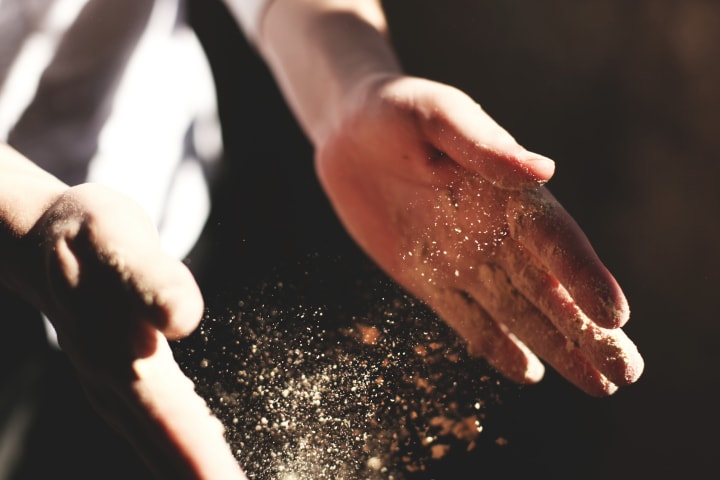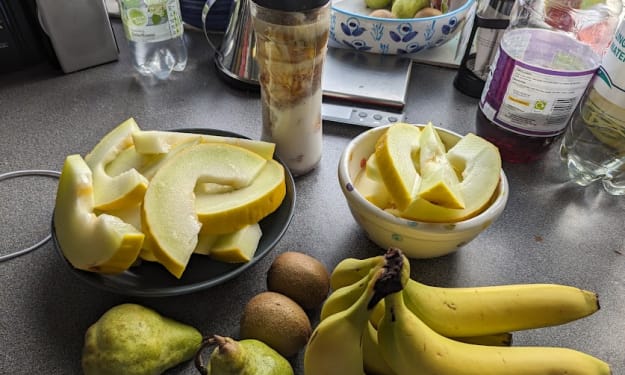Signs You Should Be a Chef
If you pay heed to these signs you should be a chef, you may find yourself in the career of your dreams.

Being a chef is part art, part chemistry, part chaos, and an all-around entirely unique career path. Maybe your friends and family already consider you the resident chef, since you can make something more interesting than pasta with jarred sauce. Maybe you just love messing around in the kitchen, and never follow exactly the same recipe twice. These, and many more, are signs you should be a chef—or at least consider the possibility. After all, though the life and job of a chef can be chaotic, they can also be immensely satisfying. If any of these traits hold true, check out the potential signs and play with the idea of starting your new life in the culinary industry.
You're a bit of a chemist.

Photo from Pixabay via Pexels
Now, I'm not saying that all chemists will make great chefs. I know some chemists that could burn the house down trying to make pasta. However, cooking is, in many ways, a lot like chemistry. People with a knack for chemistry understand the results of various reactions: Like the awesome combination of aluminum and bromine. In cooking, the results you're going for aren't spectacular reactions or, more often, new substances like the compound aluminum bromide. Rather, chefs combine substances to create taste, texture, even visual appeal. The idea remains the same: Combine the right substances, the right way, and you have a product very much worth making. If you've always had an affinity for chemistry, it may be a sign you should be a chef.
You're always ready to jump in.
Another sign you should be a chef is simple excitement about new foods. When you travel, you're always eager to find new, interesting foods. Maybe you take particular pleasure in watching how those foods are made, or having a hand in making them yourself. The point is, people with a passion for food, who may make great chefs, are genuinely interested in new foods and new methods.
Chef life means you're also always ready to jump in and help cook when you visit friends and family—you might even be that type that ends up taking over the whole operation. You volunteer your assistance in the kitchen easily, without being asked, and enjoy doing it. I mean, you may even be that guy at the party that everyone loves for whipping a delicious dip from the host's pantry.
You have a repertoire of perfected recipes.

Photo by Eaters Collective on Unsplash
Are your friends and family constantly badgering your to make your special [insert staple dish here]? Do you often hear the phrase, "I tried your recipe, but it's just not the same!" Well, those are certainly signs you should be a chef. The foundation for success in the culinary industry is understanding how to make and utilize basic techniques, things as simple as making a béchamel sauce without lumps. If your love and aptitude for cooking already make up an important part of your every day life, and you've learned the best techniques and recipes for your favorite dishes, you may just make an excellent professional chef.
You're not afraid to mix it up.
Beyond having a basic repertoire of recipes, those with culinary potential can't be afraid to mix it up every once in a while, and might enjoy spending their free time "experimenting" with new dishes. This might not always turn out well, of course, but that kind of culinary curiosity and willingness to try new things are important traits in any would-be chef. Obviously, you won't be serving the public your experiments on their first go, but you can quickly build up your repertoire of delicious dishes by trying different things. This also means being open to inspiration: Perhaps you enjoy watching the preparation of exotic foods when you travel, or find yourself chatting with the chef at a restaurant when you particularly enjoyed their food. The point is, you ought to have a deep curiosity for potential new additions to your own culinary ability.
Your friends hate eating out with you.

Photo by bruce mars from Pexels
No, that doesn't say, "Your friends hating eating without you." One sign you should be a chef is having a, well, discerning taste for quality food. Which can be a real nuisance to your friends and family, when you can't seem to turn off the food critic part of you. However, annoying as it may be, being critical of food, and being able to articulate what's wrong with a dish, or what would improve it, is a necessary trait for any chef. After all, how can anyone successfully cook a dish without understanding what makes it good or bad? Chefs are not recipe-following robots. To be successful in the culinary field, you need to be able to taste your work, make accurate judgements, and then make any necessary adjustments to make it great.
You're not afraid of untraditional working conditions.
There are signs you should become a chef because of your aptitude and interest in the work, and then there are signs you should be a chef because you can, no pun intended, take the heat. Being a chef is no 9 to 5 office job, your co-workers are not corporate monkeys, and your workplace is no place for neatly ironed slacks. To be a chef, you must be able to handle the long hours, the chaos of a professional kitchen, and be comfortable rolling with any changes that may come up. This isn't to say that chefs have to be comfortable working under badconditions—just that you need to have the right kind of personality to handle the hectic days and long hours.
You love fire.

Photo by Ash Edmonds on Unsplash
If you want to be a chef, you can't be afraid of a little fire. Now, if you're a pyromaniac, you might want to consider a career that doesn't involve fire at all, for your sake and ours. A healthy appreciation of the wonderful things that fire can do for us though might be a sign you should be chef. In a professional kitchen, you have fires burning all the time, and one of the most important jobs of any kitchen worker is knowing how to handle flames and keeping things under control—while not being afraid of a little heat.
You always announce your presence and whereabouts.
Are you the kind of the person who yells, "On your left," as you pass someone else jogging or biking? Do you preemptively announce your presence so as not to startle or run into someone when you walk into a room? If so, you've already mastered one of the crucial, non-cooking related skills of a chef.
Kitchens are full of hazards. Fire, as we just mentioned, is a big one. Sharp knives and tools certainly count as well. Perhaps the most common hazard for any kitchen worker is the movement of heavy, scalding plates, pots, pans, and dishes. In a kitchen, you need to make sure that you're not in danger of crashing into anyone, and that no one else is in danger of crashing into you—especially when transporting a pot or a dish. A quick "Coming through," or, "Behind ya," may just become your new catchphrases.
You've always been a hands-on kind of person.

Photo by Austin Ban on Unsplash
Some people can read a manual or technical book, and think, "Yeah, okay, now I know how to do that." Others prefer a hands-on approach. I, for one, could read an entire library on a skill, but not reallyunderstand it until I do it for myself. Even looking through the best apps for learning how to cook may not do the job for some people. Cooking is a very hands-on operation, which draws hands-on kinds of people. If you like to jump in and try things out, rather than just watching, listening, or reading about them, cooking may be a very rewarding experience for you.
If there's one thing chefs know well, it's that cooking isn't just a matter of following a recipe. The best dishes result from at least someimprovisation, whether it be from tasting and adjusting or the relationship between the chef and the food, not between the chef and a recipe.
You're cool under pressure.
Probably one of the biggest signs you should be a chef is that you can handle both the proverbial and actual heat in the kitchen. I don't want to turn anyone off of their culinary dreams by continuing to bring up chaos, but it plays an important role in a chef's success or failure. If you're easily overwhelmed by a hectic, chaotic workspace, and you tend to break down under pressure, you may not love the professional culinary scene. On the other hand, many people thrive on this energy, and work well under pressure. There's good reason why there are a number of chef hacks to save you time in the kitchen; pressure is not something you can avoid as a chef. You and the rest of the kitchen staff need to be able to work quickly and efficiently, and keep things moving at all costs—after all, there are people waiting for their food. You can't afford to let one little mishap derail the whole operation, so you should always be ready to improvise and adjust when necessary.
About the Creator
Nicola P. Young
Lover of Books, Saxophone, Blogs, and Dogs. Not necessarily in that order. Book blogger at heartofinkandpaper.com.






Comments
There are no comments for this story
Be the first to respond and start the conversation.